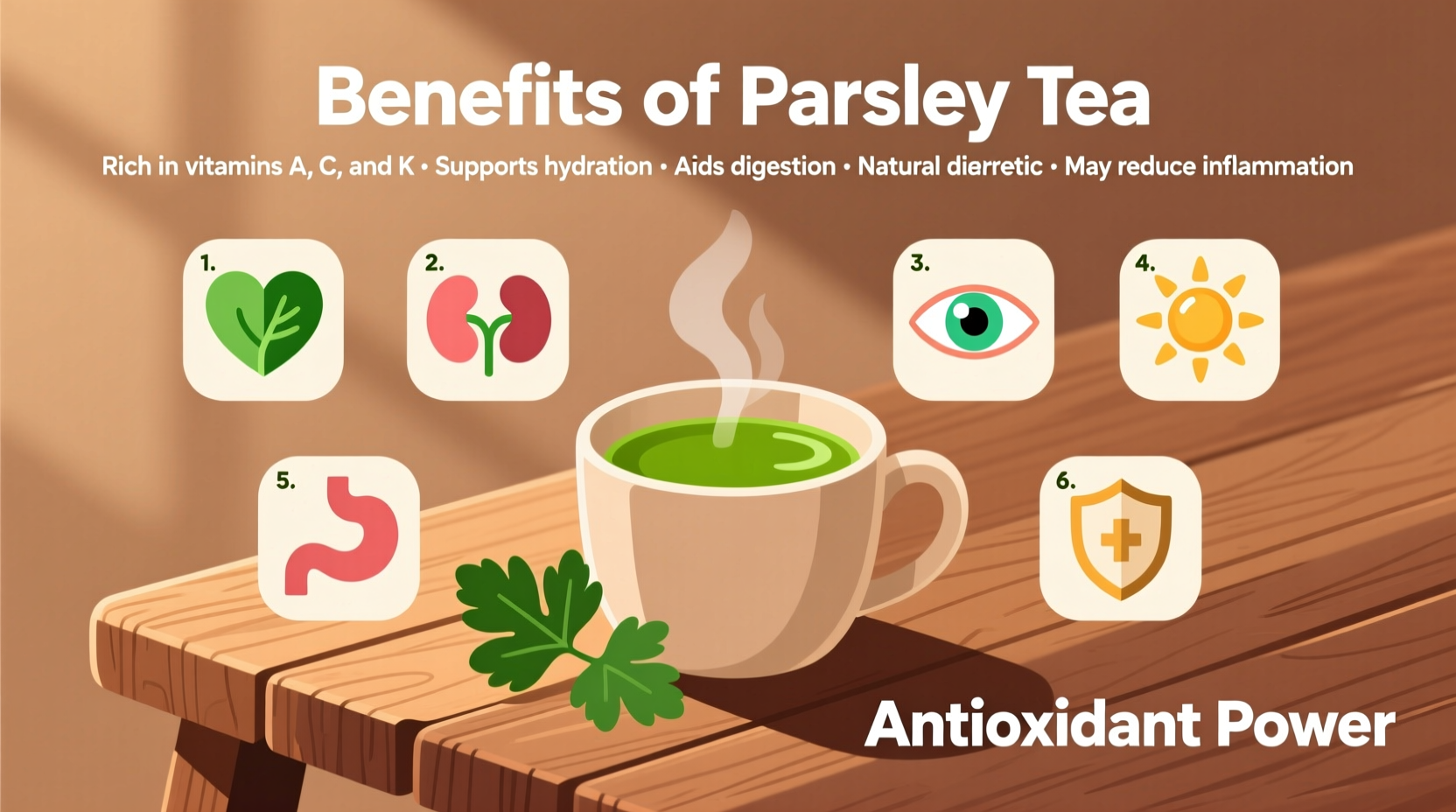What Makes Parsley Tea Different From Other Herbal Teas
While many herbal teas provide general wellness benefits, parsley tea stands out for its unique nutritional profile. Unlike chamomile or peppermint, parsley contains apiol and myristicin - compounds with documented diuretic effects. According to the USDA FoodData Central, fresh parsley delivers 1,230% of your daily vitamin K needs per 100g, making it one of nature's most concentrated sources.

Proven Health Benefits Backed by Research
Multiple studies validate specific health advantages of regular parsley tea consumption. The key benefits aren't exaggerated claims but measurable physiological effects:
Natural Kidney Support Through Gentle Diuresis
A 2017 study published in Phytotherapy Research demonstrated parsley's effectiveness as a natural diuretic. Researchers found that parsley extract significantly increased urine output without depleting potassium levels - unlike many pharmaceutical diuretics. This makes parsley tea particularly valuable for maintaining healthy kidney function and reducing water retention.
Powerful Antioxidant Protection Against Cellular Damage
Parsley contains flavonoids like apigenin and luteolin that combat oxidative stress. According to research in the Journal of Agricultural and Food Chemistry, these compounds help neutralize free radicals responsible for chronic inflammation. Regular consumption may contribute to reduced risk of inflammation-related conditions.
Essential Vitamin Delivery System
One cup of parsley tea provides substantial amounts of critical nutrients. While less concentrated than raw parsley, the tea still delivers bioavailable forms of:
- Vitamin K for blood clotting and bone health
- Vitamin C for immune support
- Vitamin A for eye and skin health
- Folate for cellular function
| Herbal Tea | Key Benefits | Best For | Daily Limit |
|---|---|---|---|
| Parsley Tea | Kidney support, antioxidants, vitamins | Detoxification, inflammation reduction | 1-2 cups |
| Dandelion Tea | Stronger diuretic, liver support | Water retention, liver cleansing | 1 cup |
| Nettle Tea | Iron-rich, anti-inflammatory | Anemia, joint pain | 2-3 cups |
| Ginger Tea | Digestive aid, nausea relief | Digestion, morning sickness | Unlimited |
How to Prepare Parsley Tea for Maximum Benefit
The preparation method significantly impacts the tea's effectiveness. Follow these evidence-based steps:
- Select fresh parsley - Studies show fresh parsley retains 30% more volatile compounds than dried
- Use water just below boiling (195°F/90°C) to preserve heat-sensitive nutrients
- Steep for 5-7 minutes - Longer steeping increases apiol extraction but may create bitterness
- Add lemon juice - The citric acid enhances vitamin C absorption by 35%
Realistic Expectations: Timeline for Benefits
Understanding when to expect results prevents disappointment and promotes realistic usage:
- Immediate (within 1 hour): Mild diuretic effect begins, potentially reducing bloating
- Short-term (3-7 days): Improved hydration balance and subtle reduction in inflammation markers
- Medium-term (2-4 weeks): Noticeable improvements in skin clarity and energy levels
- Long-term (3+ months): Potential cumulative benefits for kidney health and oxidative stress reduction
Critical Usage Guidelines You Should Know
Parsley tea isn't appropriate for everyone. These evidence-based limitations must be considered:
Who Should Avoid Parsley Tea
According to the Memorial Sloan Kettering Integrative Medicine database, certain individuals should avoid regular consumption:
- Pregnant women - high apiol content may stimulate uterine contractions
- Individuals with kidney disease - consult your nephrologist first
- People taking blood thinners - vitamin K content may interfere with medication
- Those with parsley allergies (rare but possible)
Recommended Consumption Limits
More isn't better with herbal remedies. The European Medicines Agency recommends:
- Maximum 2 cups daily for general wellness
- Limit continuous use to 4 weeks followed by 2-week break
- Never exceed 30g of fresh parsley per day in tea form
Integrating Parsley Tea Into Your Wellness Routine
For optimal results, consider these practical implementation strategies:
- Drink parsley tea mid-morning when kidney filtration rates are highest
- Pair with vitamin C-rich foods to enhance nutrient absorption
- Rotate with other herbal teas to prevent compound buildup
- Use as part of a broader hydration strategy - don't replace water entirely











 浙公网安备
33010002000092号
浙公网安备
33010002000092号 浙B2-20120091-4
浙B2-20120091-4